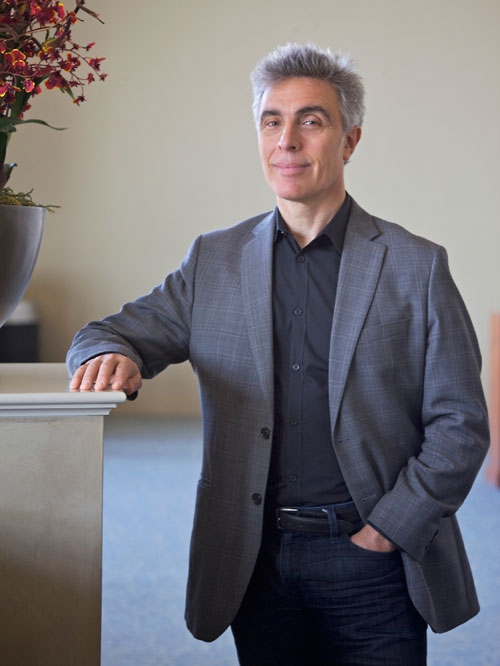An entrepreneurial spirit may not be the first thing that comes to mind when talking about orchestra conductors, but David Lockington said that spirit is exactly what helped him launch a successful career.
As part of that career, Lockington served as music director of the Grand Rapids Symphony for an impressive 16 years.
“Being a conductor is actually a very hard job, especially to make a start and sustain a living. You’ve got to be quite entrepreneurial unless you’re with a larger organization,” Lockington said. “You need the backing of a larger organization at first and you also need a manager to be able to find you work. I’ve had a manager since the late 1990s who sends me around the country whenever she can get me jobs, and those are usually for a week or a few weeks at a time.”
Those jobs included many years as a guest conductor in Spain. Lockington said it’s almost impossible to sustain a career as a guest conductor and he knows many conductors who start their own ensembles if they’re not on an academic track.
These days, Lockington, who just turned 61, conducts orchestras in Modesto and Pasadena, both in California, and also has a relationship with the Northwest Sinfonietta, a classical chamber music orchestra in Tacoma, Wash.
He has been the music director of the Modesto Symphony since 2007 and in 2013 was appointed music director of the Pasadena Symphony. After serving as music director of the Grand Rapids Symphony Orchestra from 1999 to 2015, he now serves as the conductor laureate.
The decision to leave his position in Grand Rapids and seek other opportunities is just the nature of the profession, according to Lockington.
“Sixteen years is a very long tenure,” he said. “With an established orchestra, it’s probably more normal to be there between eight and 10 years or less than that. It’s like being a coach or something. You’re charged with a job and you execute your mission and you gather people around to help you with that.”
When the job is done, it’s time to move on, he said.
“With the Grand Rapids Symphony, I felt I had done what I had set out to do and it felt like it was time to move on and hand off the baton to someone else,” Lockington said. “It’s a very hard relationship to sustain that long with musicians. It’s like a marriage.”
This decision cleared the way for new opportunities. That's translated into more travel and less time at the Kentwood home that he shares with his wife.
Lockington typically travels for work between September and June, which has left Dylana Jenson, his wife and a professional violinist, with a majority of the responsibility for running their household and caring for their four children, one of whom is still in high school. In addition, she operates the String Academy of Grand Rapids housed in Fountain Street Church.
“The hardest thing has been my being away,” Lockington said. “My wife has been an extraordinarily devoted mother with lots of challenges. While she deals with crises at home, I’ve been off conducting.
“Part of me has been rather selfish about it, but that’s true for a lot of people who want to be in this profession.”
The upside for the couple is that they get to perform together and understand each other because they are both musicians.
“When we perform together, as long as I follow her, it’s fine,” he said with a chuckle. “One of the good things we share is we don’t have to talk about the process of music, because we know what goes into it and what that life is all about.”
Jenson is performing with her husband during his trip to the west coast and also will perform when Lockington conducts the Grand Rapids Symphony in March.
Born in London to a musical family – his father was a podiatrist and an amateur cellist and conductor – Lockington attended Cambridge University and studied the cello at Yale University where he earned a master’s degree. His first professional job was assistant conductor with the Denver Symphony Orchestra.
From this point on, he fully embraced the life of a conductor and began mastering the flexibility that is so critical to the job.
“It’s always nice to work with new people and the dynamics with every orchestra are completely different,” Lockington said.
While there are conductors who gravitate toward academic endeavors and those who are more flamboyant or thirsty for power, Lockington describes himself as altruistic and passionate about what he does, and he plans to perform as long as he can.
“I enjoy performing a lot, but I’m not an attention-seeker. I love the psychology that goes into motivating people and I love that expressive life,” Lockington said. “If I do this long enough, I might be really good by the time I die.”





